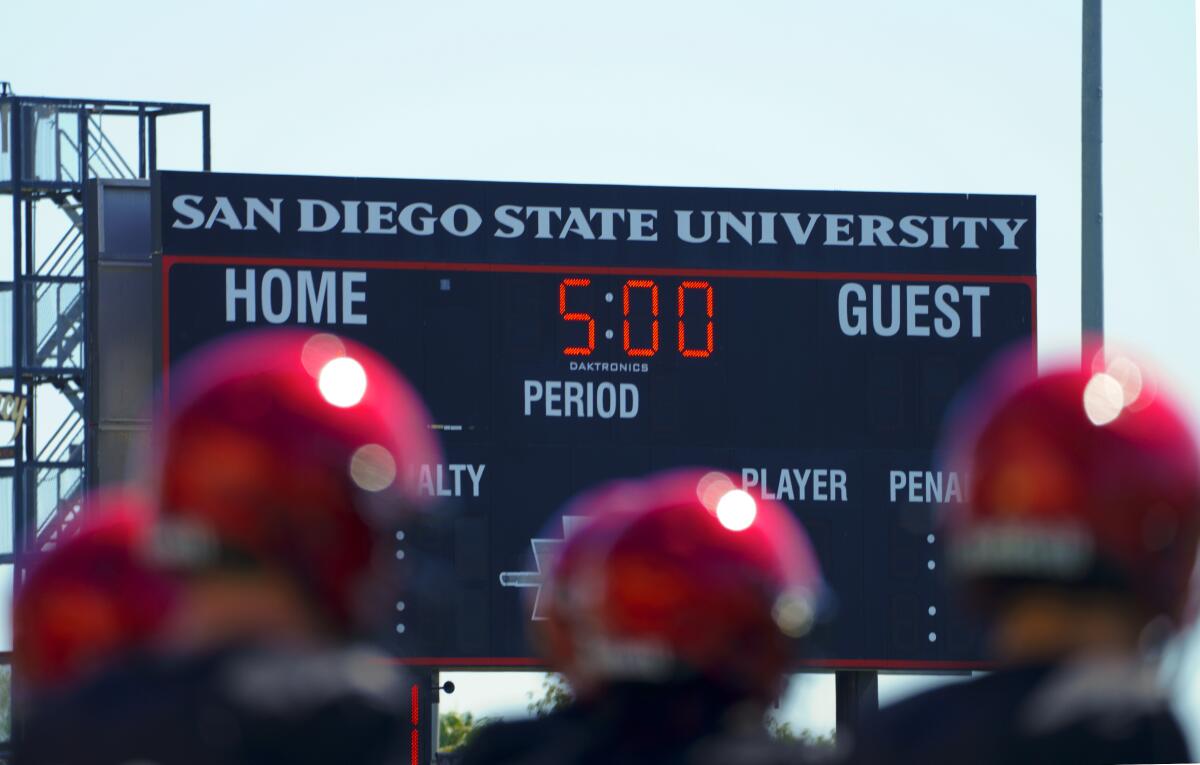Audio reveals tense, emotional meeting in D.A.’s office over SDSU gang rape allegations

- Share via
SAN DIEGO — Nearly eight minutes into a meeting last year, the prosecutor broke the news to an 18-year-old woman who reported that multiple men had raped her at a College Area house party: There would be no criminal charges.
She started to sob.
The young woman had gone to police the day after the October 2021 incident, which happened when she was 17 and a high school senior. She’d undergone an invasive sexual assault exam. She had worked with investigators, granted their request to make recorded phone calls with San Diego State University football players who’d emerged as potential suspects. And she had waited for months as detectives investigated.
This story is for subscribers
We offer subscribers exclusive access to our best journalism.
Thank you for your support.
The case would later make headlines. Names of the accused were made public after the woman filed a civil lawsuit. One, who maintained he was innocent, lost his job as an NFL punter. Her attorney was tweeting information about the allegations. His attorneys were pushing back.
Over an hour and a half during that Dec. 7 meeting, the prosecutor who reviewed the case walked the woman — with her lawyer and a victim advocate at her side — through the legal reasons behind the decision not to file charges. Along the way, the attorney gave her room to ask questions, to challenge what she was being told, to grieve.
“I know you’re gonna have a lot of questions for me, and I want you to interrupt me,” Deputy Dist. Atty. Trisha Amador said to the woman. “I am a big believer that if people have unanswered questions, it doesn’t help them in their processing, their healing.
“You control everything, OK?” Amador continued. “This is about you and your feelings today. I want you to feel comfortable.”
The Union-Tribune obtained an audio recording of the meeting, which provided insight into why the San Diego County district attorney’s office opted not to file a case. It also offered a glimpse at the approach prosecutors take when working with people who report sexual assaults.
Former Buffalo Bills punter and standout SDSU football player Matt Araiza and two teammates had been accused of rape in a civil lawsuit
Details of her allegations are laid out in investigative and court documents and in the woman’s civil suit, filed last summer. The Union-Tribune generally does not name victims of alleged sexual assaults.
The lawsuit accuses three now-former Aztec players: NFL prospect and then-senior Matt Araiza, and then-redshirt freshmen Zavier Leonard and Nowlin “Pa’a” Ewaliko.
In her suit, the woman says Araiza had sex with her in a side yard of the residence, before she was taken to a bedroom, where a group of men took turns raping her. She said she stumbled out of the room bloodied.
The three men maintain through their attorneys that they are innocent of the accusations and said encounters with the woman were consensual. Araiza’s attorneys point to a witness who said they saw Araiza leave the party well before the assaults in the bedroom she reported later.
In last year’s meeting — more than a year after she made her report to police — the woman learned details about nine short video clips recorded at the party, some of which were in a Snapchat format. The videos were “point of view” shots taken from the perspective of those engaging in sexual acts with the teen. Araiza does not appear in the clips, prosecutors say.
Hearing slated Thursday for battle over release of videos to civil attorneys for Matt Araiza, former SDSU punter accused of assaulting teen. He and two other former Aztec players say they are innocent.
Those few seconds of videos were found during a police investigation that turned up four terabytes of evidence. Investigators talked to the woman’s friends and to party attendees. They gathered forensic evidence, cellphone data and DNA tests, and constructed a timeline of events.
Amador told the woman her office considered all of it. Prosecutors could not move forward with a case.
Rarely, if ever, is the public made aware of the reasoning behind such a decision. The audio provides a raw look at a difficult exchange that was, at times, tense and emotional.
The woman’s attorney, Dan Gilleon, however, stressed that the meeting was intentionally focused on the reasons prosecutors couldn’t make a case. They didn’t talk about facts in her favor, he said.
When asked to comment on the December meeting, the district attorney’s office said in a Friday statement that treating victims with “dignity, respect, courtesy and sensitivity” is a priority.
“Even in instances where we cannot file charges because we cannot prove a crime beyond a reasonable doubt, we reach out to the victims so they can meet with us so we can explain why the case cannot be filed and answer their questions,” the statement read.
Statutory rape
In California, it’s illegal to have sex with someone under the age of 18. But there are caveats in the law, Amador explained in the recording of meeting.
Namely, a suspect can argue they had a “reasonable and actual belief” that the person they had sex with was 18.
In her lawsuit, the teen said she told people at the party she was 17 and a student at Grossmont High School. At least one friend told investigators the teen had explicitly stated her age.
But others told investigators they didn’t recall age being brought up at all. One friend assumed anyone at the party would have thought the teen and her friends were in college, Amador said. The teen told police detectives she had told people at the party she was a student at “Grossmont” — a high school in East County — but Grossmont is also the name of a community college not far from San Diego State.
At least two witnesses at the party reportedly heard the teen say she was 18, Amador said. There was also a video of the teen at a different party the night before in which she states she was 18.
“So what I have are a variety of witnesses that are giving different accounts as to your age and what people would have known at the party,” Amador said to the woman.
She said later: “I cannot prove beyond a reasonable doubt that anybody would have known that you were [17 years old].”
Rape by intoxication
In order to prove rape by intoxication, prosecutors have to prove that an intoxicating substance prevented the teen from resisting and that any potential suspect reasonably should have known the effect the substance was having, Amador said.
A potential suspect can argue, Amador explained, that they reasonably believed the person was capable of consenting to the act — even if that is untrue. In other words, the suspect can say the person didn’t appear to be drunk or high or in a substance-altered state.
The perceptions of others matter.
“So you look at the objective symptomology, what other people are seeing, not how you’re feeling at the time,” Amador said.
In search warrant affidavits, she told detectives she had consumed at least seven shots of alcohol. But there were varying statements about how intoxicated the teen appeared to be that night, Amador explained.
Several of the teen’s friends said she returned to her group twice in the night to say she had just had sex — once after an encounter with Araiza at the side of the house, and once after having reportedly having sex with Ewaliko in the living room of the home, the prosecutor said.
Her friends said the teen didn’t appear scared, distraught or obviously intoxicated, and that she was speaking about the encounters as if they were consensual.
Forcible rape
In order to file forcible rape charges, California law dictates that prosecutors must be able to prove that sex occurred under the threat of force, violence, duress, menace or fear of immediate bodily injury, Amador explained to the young woman.
Among considerations for prosecutors: Did the potential suspects use enough physical force to overwhelm the teen’s will? Did she appear afraid? Did the potential suspects threaten to use force or retribution if the teen did not participate?
The teenager, referred to in search warrant affidavits as Jane Doe, told detectives she was taken to a bedroom with multiple men inside. She said she was not scared, but felt “defeated” and knew that something was going to happen.
“Doe felt that the males were going to do what they wanted to do, and she was going to cooperate so that she was not seriously hurt,” according to the search warrant affidavits. “Doe was in and out of consciousness at this point and her memory was hazy.”
She said she believed two videos were recorded as the assailants performed sexual acts on her, the warrants read, and that she had recognized the “glitch” sound made when an image is uploaded to Snapchat.
“During the assault, Doe heard one of the males say, ‘Who’s next?’ ” the warrants read.
From what authorities described to the woman, the video framing is tight. Gilleon said the clips don’t tell the whole story.
“I mean, these videos don’t show who was in the room,” he said.
Araiza’s attorneys are pushing the court to release the videos to them, maintaining they will bolster his defense.
Amador and District Attorney Investigator Ted Mansour told the woman during the meeting that, based on the videos, they could see no signs of obvious trauma.
“In looking at the videos… I absolutely cannot prove any forcible sexual assault happened,” Amador said.
The prosecutor also noted in the meeting that a medical expert wasn’t able to determine whether some of the teen’s apparent injuries were bruises or hickeys, and that she had, at one point, described the marks as possible hickeys to investigators.
Amador said forensic nurses who performed the sexual assault examination didn’t find evidence of forced penetration, but the prosecutor stressed that medical experts said that did not mean no crime occurred.
Video evidence
The woman’s civil case is moving forward. In a civil trial, the standard of proof is far lower than in a criminal trial, where the standard is beyond a reasonable doubt. Civil cases must meet a standard known as a preponderance of evidence. More simply, the allegations must be more likely to be true than not true.
The existence of the videos adds a layer of complexity. The clips are short. The woman told police the incident lasted more than an hour.
Gilleon said the images prove nothing outside of the few seconds and limited visual area they depict. He also said the men who recorded them were careful about what the images showed.
Araiza’s legal team won the first skirmish over the videos when San Diego Superior Court Judge Jeffrey Fraser agreed Thursday to unseal them. But whether anyone beyond police and prosecutors will be allowed to view them remains both a question and a likely future court battle.
The woman was 17 at the time. Technically, the video clips are considered child pornography.
Better serving survivors
The district attorney’s office said Friday that its sex crimes and human trafficking division has a team of prosecutors, investigators and victim advocates who are trained on ways to be trauma-informed when working with victims.
Advocates have been working for decades to help institutions better serve survivors of sexual violence, but there is still much to do.
By some estimations, less than 1% of rape cases result in conviction. That’s a problem, said Brenda Tracy, a speaker and activist who in 1998 reported being gang raped by college football players in Oregon.
Sexual violence can have long-term effects on the health and well-being of survivors, Tracy said. Since many never expect to get their day in court, advocates have worked to create other ways to find healing.
“There are lifelong consequences,” Tracy said. “It makes you question your value, your worth and your ability to be safe in the world.”
Tracy said while it’s certainly important that institutions like the district attorney’s office and police investigators work with survivors in a trauma-informed way, perhaps the most trauma-informed thing institutions can do is to take the case.
“I think at some point we have to decide there are cases we’re going to move forward with,” Tracy said. “Even if there’s a chance you might lose, there’s still a benefit in moving forward with cases. You’re showing people we’re going to try to push the needle on this.”
Former San Diego County Dist. Atty. Paul Pfingst said prosecutors are required to prove their case beyond a reasonable doubt, which means jurors must be left with an abiding belief that the charges are true.
“The No. 1 responsibility of a D.A. is to prosecute only guilty people when you can prove the person’s guilt,” said Pfingst, now a defense attorney, “and your sympathy for a victim cannot be allowed to overwhelm your analysis of the facts.”
More to Read
Sign up for Essential California
The most important California stories and recommendations in your inbox every morning.
You may occasionally receive promotional content from the Los Angeles Times.













